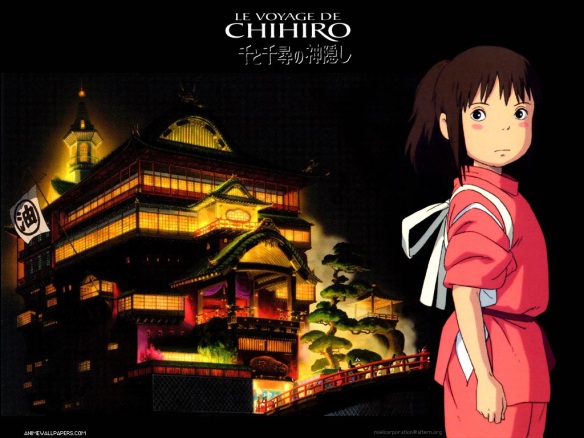 Tsunderin: Outside of Princess Mononoke it’s clear that Spirited Away leads the pack of most well-loved Ghibli films in America. Certainly with an Academy Award and several other honors to its name, the impact of this film upon animation as a serious genre in filmmaking on an international level cannot be ignored. But on a slightly less foundation-shaking level, the film is just plain enjoyable to watch. So much so that I don’t think I know one person who hasn’t seen the film or at least knows the story on some level, even among my non-anime watching compatriots.
Tsunderin: Outside of Princess Mononoke it’s clear that Spirited Away leads the pack of most well-loved Ghibli films in America. Certainly with an Academy Award and several other honors to its name, the impact of this film upon animation as a serious genre in filmmaking on an international level cannot be ignored. But on a slightly less foundation-shaking level, the film is just plain enjoyable to watch. So much so that I don’t think I know one person who hasn’t seen the film or at least knows the story on some level, even among my non-anime watching compatriots.
It all starts with young Chihiro, pouting at the fact that she’s being forced to move with her parents away from her friends and her old life. Her family gets lost in the forests of the countryside and decides to make a pit stop to try and get their bearings. However, Chihiro’s parents become enraptured with what they think is an amusement park styled after ancient Japan. While her parents stuff their faces at a food stall, Chihiro continues on exploring. She comes across a young boy named Haku who warns her that if she doesn’t leave before the sun sets, something terrible will happen. Despite her best efforts, Chihiro finds she can’t leave with her family because the food they’ve eaten has turned them into pigs. Thus, they are stuck within the realm of the spirits.
In an effort to return her parents back to normal, and at Haku’s insistence, Chihiro applies for a job at a bathhouse. Yubaba, the bathhouse owner, is also the only one capable of restoring her parents to their original forms. However, in return for a job, Chihiro ends up giving away her original name and being renamed ‘Sen’ by Yubaba. If Chihiro forgets her name entirely, if she ‘becomes Sen’, Yubaba will have control over her for the rest of her life. From then on, young Sen makes it a mission to remember everything.
Luckily, many of the spirits that frequent and work at the bathhouse are rather nice and indeed, Sen’s first customer thanks her for relieving him of his grime and refuse by gifting her a medicinal dumpling. At the same time, an amorphous spirit known as No-Face has begun showering the employees with gold, but also ends up eating quite a few workers in return: the more the workers lust over the gold, the more corpulent and greedy No-Face becomes. As much as Yubaba revels in her profits, she can’t have someone eating her workers, and she also has another problem at hand.
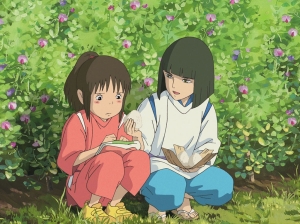 One night after Haku comes crashing into Yubaba’s suite in a dizzied frenzy, it’s revealed after the debris clears that he’s brought a guest with him: Yubaba’s sister, Zeniba. In her short appearance, Zeniba curses Yubaba’s baby into taking the form of a rat as well as cursing her pet bird into the form of a fly. Before she disappears entirely, Zeniba warns Sen that Haku has stolen something from her, a golden seal, and that it carries a deadly curse. In order to retrieve it from the young boy, Sen feeds Haku part of the medicinal dumpling, which causes him to vomit the golden seal up as well as an ink-like worm which is the embodiment of a curse.
One night after Haku comes crashing into Yubaba’s suite in a dizzied frenzy, it’s revealed after the debris clears that he’s brought a guest with him: Yubaba’s sister, Zeniba. In her short appearance, Zeniba curses Yubaba’s baby into taking the form of a rat as well as cursing her pet bird into the form of a fly. Before she disappears entirely, Zeniba warns Sen that Haku has stolen something from her, a golden seal, and that it carries a deadly curse. In order to retrieve it from the young boy, Sen feeds Haku part of the medicinal dumpling, which causes him to vomit the golden seal up as well as an ink-like worm which is the embodiment of a curse.
Because Haku is incapacitated, Sen resolves to return Zeniba’s seal on her own and apologize for Haku’s rudeness. On her way, she runs into No-Face, who tries to seduce her with the riches he offered others before her. Unlike them, she simply isn’t interested in the gold. Completely flabbergasted, it continues to offer her more and more until it goes into a rage. Figuring out that this spirit has already eaten about ten of her co-workers by this point, Sen feeds No-Face the rest of the medicinal dumpling, which causes him to vomit everything and everyone back into the bathhouse. Due to her kindness and strength, No-Face becomes enraptured with Sen and follows her to Zeniba’s house.
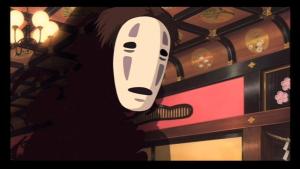 Once they arrive at Zeniba’s, Sen discovers that Haku’s curse is broken. However, it wasn’t broken by her returning the golden seal. Rather, when she stepped on the ink-like worm Haku vomited up, he became free—not from Zeniba’s curse, but from Yubaba’s. Zeniba actually turns out to be kind and compassionate—the exact opposite of her sister.
Once they arrive at Zeniba’s, Sen discovers that Haku’s curse is broken. However, it wasn’t broken by her returning the golden seal. Rather, when she stepped on the ink-like worm Haku vomited up, he became free—not from Zeniba’s curse, but from Yubaba’s. Zeniba actually turns out to be kind and compassionate—the exact opposite of her sister.
Haku suddenly arrives and interrupts their conversation, urging Sen to return to the bathhouse. Yubaba has blamed Sen for the destruction caused by No-Face, and because of that the old woman decided to put her parents up for slaughter. However, if Sen can complete Yubaba’s final test, both she and her parents can return to the mortal world.
On the journey back, Sen manages to figure out that Haku is actually the spirit of the Kohaku River which grants him back his name, breaking Yubaba’s curse in its entirety. With this boost of confidence, and the support of every worker at the bathhouse, Sen faces her final challenge: picking her parents out from a group of pigs. Studying them carefully, she comes to the correct conclusion that none of them are her parents. With that, her name is returned to her and she hastily returns back to the human world.
When she returns to the clearing where their car was parked, it’s clear that Chihiro’s parents remember nothing. Yet with her new friends, memory, and belief in herself, Chihiro is ready to face the new challenges that await her in her new home and her new life.
MadameAce: Like many stories by Miyazaki before this one, Spirited Away is also a coming of age tale. Again, I’m not the biggest fan of this kind of story, especially if the entire conflict is internal, like it was in Kiki’s Delivery Service. Kiki’s drama came from her chronic depression, and even at the end, the dirigible catastrophe was less of an external conflict and more of a motivator for her to pick herself back up.
While it can be argued that plenty of Chihiro’s conflicts are internal—she is in the spirit world, after all, and there’s the possibility that she’ll lose herself if she forgets her real name—a lot of it is caused by external factors. Yes, her adventures in the spirit world are only serving to further her internal growth, and her problems there directly correlate to her 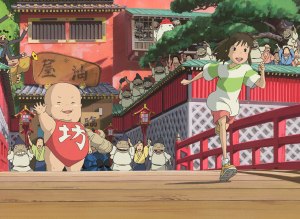 internal issues. Chihiro doesn’t feel like herself. She feels lost at the beginning of the film, due to moving, and the spirit world only emphasizes this through the loss of her name. Chihiro is in constant danger of not remembering who she is because of it and therefore remaining lost forever.
internal issues. Chihiro doesn’t feel like herself. She feels lost at the beginning of the film, due to moving, and the spirit world only emphasizes this through the loss of her name. Chihiro is in constant danger of not remembering who she is because of it and therefore remaining lost forever.
However, the story is told in such a way that I could very easily forget that I don’t like coming-of-age tales and just enjoy what’s happening on the screen. Aside from My Neighbor Totoro, Spirited Away is my favorite Ghibli film. I love the characters, I love the stakes, I love the stunning visuals, and I really love the mythology.
Quite a while ago, I wrote the post Manga Mondays: Spirited Away, and in it I touched heavily on the Shinto themes found in this film. Almost every scene has something directly out of Japanese mythology and Shintoism. The Shintoism is much more noticeable, considering that the main setting is a bathhouse and Shintoism deals a lot with water and cleanliness. I also mentioned that Chihiro is becoming a mizuko—translated as ‘water child’—which, according to Shintoism, is a child who doesn’t have a name and is filled with anger and grief, leading that child’s spirit to causing trouble. And Chihiro as Sen causes a lot of trouble for Yubaba and the bathhouse.
However, traditional Japanese mythology doesn’t take long to appear either, and that is actually what leads Chihiro and her family into the spirit world. After getting lost in the woods, they come across a tunnel with a stone statue sitting outside it. I mentioned in my earlier post that due to the large amount of religion found in this film, it’s easy to interpret something from nothing and read too much into the mythos. However, the stone in front of the tunnel can easily be analogous to the sun goddess Amaterasu, who secluded herself in a cave after an argument with her brother.
To top all that off, there’s the mythology that Miyazaki invented to make his story more unique, such as the fact that a person who holds his or her breath while crossing a bridge becomes invisible. This movie even goes so far as to include what I can only describe as the Japanese version of a cootie shot.
All of this is what I love so much about Spirited Away. The religious themes add a lot of depth and culture to the film. Princess Mononoke was a risk, because it had to cross a cultural barrier. People in America were nowhere near as familiar with or in love with Japanese culture when it was released, but I feel that if Mononoke hadn’t been successful, Disney wouldn’t have bothered marketing for Spirited Away to the extent that it did. Even though Spirited Away takes place in modern times, when Japan has had a longer exposure to Western influence, because the film takes the viewer into the spirit world, in many ways Spirited Away is much farther away from Western culture than Mononoke. There were plenty of people who watched this movie and thought it was just plain weird because they didn’t understand all the Shinto themes and use of mythology. Despite that, it did remarkably well in the States, and thank goodness too, because I would argue that this is one of Ghibli’s better films.
 Tsunderin: As much as I love this film and the universe which Miyazaki introduced us to, I feel like Spirited Away also reveals a troubling plot device that shows up in every one of his movies. As a lover of fluffy romance and shoujo, it hurts me to say this, but I just don’t understand why I should believe that Chihiro and Haku fell in love in the short time she was in the spirit world.
Tsunderin: As much as I love this film and the universe which Miyazaki introduced us to, I feel like Spirited Away also reveals a troubling plot device that shows up in every one of his movies. As a lover of fluffy romance and shoujo, it hurts me to say this, but I just don’t understand why I should believe that Chihiro and Haku fell in love in the short time she was in the spirit world.
Their relationship in general is vital to both of their character arcs: Chihiro discovers that she isn’t actually alone, despite feeling as though she has no control over the events in her life and Haku learns to trust again after being so heinously betrayed by Yubaba (whether he carries the exact memories of it or not is unimportant to this issue). However, there’s never a point where it’s believable that the two should fall in love. For chrissakes, Haku is an ancient river spirit and Chihiro is ten years old; no matter how much maturing she’s accomplished through the course of the film, there’s no way that she’d be able to reciprocate on the level the story is implying.
Chihiro’s and Haku’s relationship could be interpreted as their being close friends, soul friends, and I’d be willing to believe that if Miyazaki didn’t make every female protagonist of his fall in love before reaching the apex of their character development. Let’s take a look back at the movies we’ve reviewed so far: Sheeta falls for Pazu in Laputa, Kiki grows attached to Tombo’s carefree nature and surprising maturity, Fio gets a crush on Rosso (though as Rosso is the protagonist, this is somewhat off the regular theme), Shizuku and Seiji are basically a couple from the beginning of the movie, and Sen and Ashitaka share a mutual respect for each other and probably would have been together in a physical sense if Sen didn’t still totally hate humans. In fact, the only film that doesn’t fit this trend is Nausicaa, but I have a feeling that’s because Nausicaa’s indifference to everything that wasn’t Ohm-related ruined all the chemistry between her and Asbel. Having seen most of the films coming up, I can say that this trend continues on.
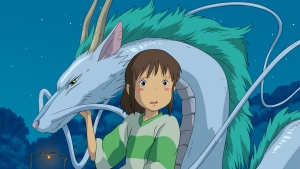 Miyazaki’s female characters are strong female characters, don’t get me wrong, but having every single one of them fall in love and have their character development ‘tested’ by their male companion is a little disheartening. I can’t be certain that this isn’t a side-effect of the demographic—love stories are easy to relate to, especially when they’re so black and white—but I would like to one day see a film where perhaps the main female and the main male remain friends rather than continuing the precedent that romantic love is the major component in reaching maturity.
Miyazaki’s female characters are strong female characters, don’t get me wrong, but having every single one of them fall in love and have their character development ‘tested’ by their male companion is a little disheartening. I can’t be certain that this isn’t a side-effect of the demographic—love stories are easy to relate to, especially when they’re so black and white—but I would like to one day see a film where perhaps the main female and the main male remain friends rather than continuing the precedent that romantic love is the major component in reaching maturity.
MadameAce: I do agree that the love-component is an annoying gimmick a lot of film makers feel the need to include in movies starring female protagonists. Regardless of everything that’s going on, it still makes the assumption that romance is an important issue to the characters. Like, Chihiro’s parents are pigs! That’s okay, because she has a man, the thing every girl wants. I disagree that Nausicaa is the only Miyazaki film that doesn’t follow this trend—as I was certain that if the characters had had any depth, Nausicaa and Asbel would have gotten together—because I think that Totoro was a nice break from it. If there had been a romance, it would have been between Satsuki and Kanta, but even then, it’s a stretch. While maybe Satsuki just comes to view Kanta as a friend, Kanta very obviously likes Satsuki romantically. The romance doesn’t really come to anything, because Satsuki has other issues she’s dealing with, like saving her sister. The same should be true of Chihiro and her parents.
Whenever I watch this film, I like to interpret Chihiro and Haku as being just friends. I find it much easier to believe that Chihiro, a ten-year-old girl, has other things to worry about than a blossoming romance. Haku is someone empathetic to her issues, because he has forgotten who he is. Naturally, Chihiro will be drawn to him for that reason, but other than heteronormativity and Haku being a boy, there’s no reason for a romance between them, especially considering the age difference.
Much like Princess Mononoke, there are many different ways this film can be looked at, including the characters’ relationships to each other. There’s also a lot to take from this film. It really is one of Miyazaki’s better movies, and it’s definitely a must-see for anyone interested in animation.


Pingback: Sexualized Saturdays: Female Chefs in the Media | Lady Geek Girl and Friends
Pingback: Fanfiction Fridays: This American Life episode 141: A Whole New World. (Transcript) by NaomiK | Lady Geek Girl and Friends